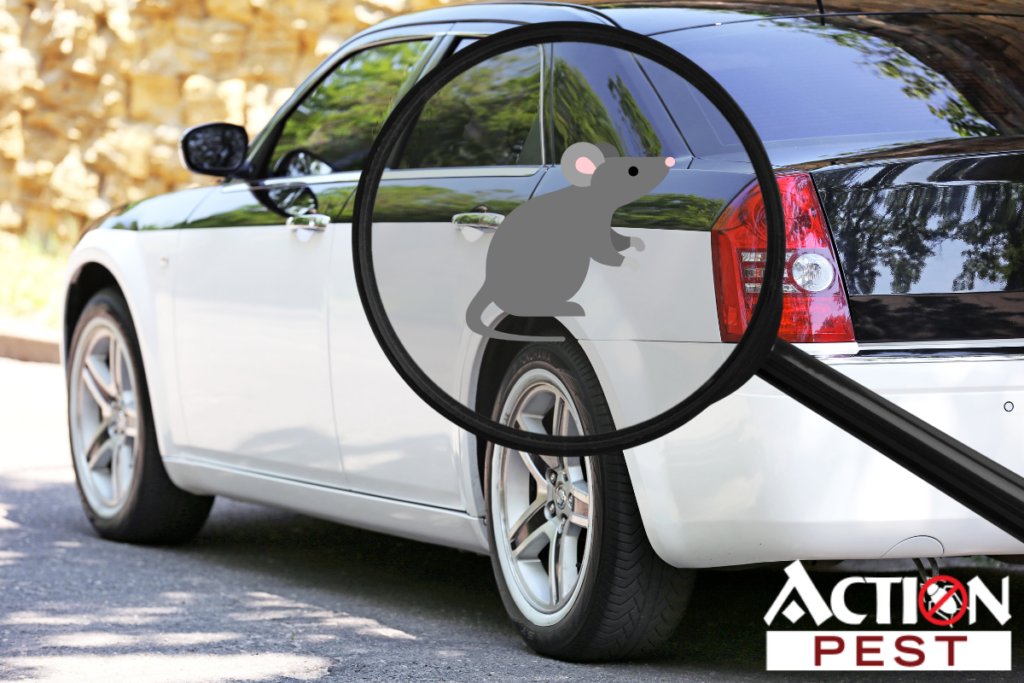
Over the years, your vehicles will eventually require some form of maintenance. However, it comes as a surprise to many car owners when they find out what’s plaguing their vehicle is a rodent infestation. Due to the pandemic, rodents have been roaming the streets more frequently. The rodent problem gets even worse during the winter seasons. Rodents like mice and rats are constantly looking for food and shelter when the temperature drops.
While some rodents find their way into your homes, others find shelter in your vehicles. Finding their way into vehicles is rather easy, mice can fit through the tiniest of holes. So, if you’re struggling with mice problems in your car, fret not! This post will shed some light on how to keep mice out of cars and provide more information on rodent control in your vehicles. Let’s begin!
How Does Mice Get Into Your Car?
I know your car seems protected every time you lock your doors and turn on the alarm. However, this is not enough to keep mice out of your car. Again, mice are quite small and often fit into crevices and openings smaller than a dime. Often, the easiest route for rodents is through the engine, once they are in, they make their way into other areas around the vehicle.
Other than through the engine, Action Pest advises car owners to also consider vents, holes around cables, steering columns, and pedal shifts as other common entries points for rodents. Also, if you don’t fix your cracked window, then consider it as a welcome sign for mice. Be sure to keep your vehicle in tip-top shape to ensure rodents stay out!
How Do You Know When A Mice Has Entered Your Car?
Mice are rather quiet and not so easy to notice once they find their way into your vehicle. But, they can also be quite dangerous so, it’s important to ensure your vehicle is rodent-free. Here are some of the signs to look out for if you suspect an unwanted rodent keeping you company in your car.
Car Problems
Since rodents do not announce their entry, most vehicle owners will first notice that their car is not functioning as efficiently. You may later learn that mice have chewed through electrical wires and insulation searching for food and nesting material. With so many electrical systems in our modern day vehicles, chewed-up wires will definitely cause faults.
Upholstery Damage
The first thing mice do when they get into your car is build a nest. So once you notice chewed-up foam, holes on the car seats, or missing chunks of insulation, that aren’t from the typical wear and tear — the chances of finding rodents in your car are pretty high.
Strange Smell
Your car may be working just fine with no apparent damage but you notice an odd odor from your vehicle. Often this strange smell comes from the air vents since mice use this route to navigate in and out of the vehicle. Also, vents provide easy access to the insulations when they are building a nest. The smell could be coming from rotten food the rodents leave behind, their urine and droppings or worse.
Mice Droppings
If there is evidence of mice dropping on the carpet, car seats, or even the dashboard, then this is a tell-tale sign that you have unwanted company in your car. Keep in mind, mice droppings are black and rice-like in size and shape.
Mouse Nest
Finding a mouse nest will automatically confirm your suspicions. If you don’t know where to start, then begin your search in the airbox. It’s isolated and provides protection from the elements. All you have to do is open the box and look for any evidence of rodents. This place should be clean so you’ll notice immediately if a mouse has decided to reside there. Also, be sure to check under the plastic engine cover if you have one.
How To Keep Mice Out Of Cars?
Now that you know how mice can get into your vehicles, it is also important to know how to keep mice out of cars. You don’t want to keep dealing with the same issues all winter long. Here are a few ways you can keep rodents away from your car.
Keep Your Car Clean
Garbage is a rat magnet, so one of the things you can do is to declutter your vehicle and throw away all the fast-food wrappers, paper, or any other items that could attract mice. If you do keep food in your car in the case of emergency, make sure they’re securely sealed in containers rodents can’t bite through.
Keep Your Car Moisture-Free
Mice love moisture and are attracted to moist areas. Be sure to keep condensation from building up in your vehicle. Locate the source of moisture in your car and address it immediately. Limiting their water source will deter them from staying in your vehicle.
Close Doors & Other Openings
This might seem simple but is one of the most effective ways on how to keep mice out of cars. Leaving your doors or the sunroof open will give mice and even neighbourhood pets all access to your car.
Conclusion – Contact Action Pest
Mice and other rodents can do numerous amounts of damage to your cars if you don’t notice them quickly enough. However, this information will help you prepare and prevent rodent infestations from happening to begin with. Although even if you complete the necessary prevention tactics, you may still get unlucky. If you are looking for more information, then you should speak with a professional pest control company with years of experience.
An expert company just like Action Pest. Action Pest has over 40 years of experience in handling pest control and removal with their high-tech equipment. For immediate pest-related services, Action Pest is available at anytime 7 days a week. Contact Action Pest today!






